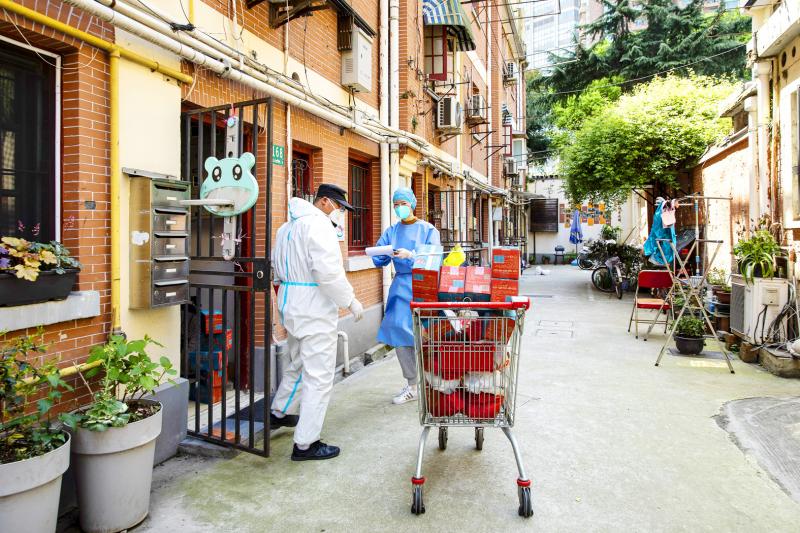Shanghai reported nearly 25,000 locally transmitted COVID-19 infections yesterday, as residents of China’s most populous city voiced complaints over food and basic supplies, and concern spread that more cities might soon be in the same situation.
Streets of the locked-down financial hub of 26 million people remained as curbs under the city’s “zero tolerance” policy allow only healthcare workers, volunteers, delivery personnel or those with special permission to go out.
Shanghai’s case numbers are small compared to some cities globally, but it is battling China’s worst COVID-19 outbreak since the virus emerged in the central city of Wuhan in 2019.

Photo: Bloomberg
Of the local cases Shanghai reported, 1,006 were symptomatic while 23,937 were classed as asymptomatic.
The city has become a test bed for China’s elimination strategy, which seeks to test, trace and centrally quarantine all people who test positive for the virus to stem its spread.
The curbs have sharply squeezed supplies of food and other essentials. Many supermarkets have been shut and thousands of couriers locked in. Access to medical care has also been a concern.
Online videos show residents struggling with security personnel and hazmat-suited medical staff at some compounds in recent days, with occupants shouting that they need food.
Executives for e-commerce giants JD.com and food delivery service Ele.me attended the city’s daily briefing, seeking to convince residents that bottlenecks would soon ease.
JD.com vice president Wang Wenbo (王文博) said he understands concerns about delivery speed and that the company is focusing on basic foodstuffs and baby care items.
Ele.me senior vice president Xiao Shuixian (肖水賢) said his company had brought in 2,800 more delivery workers over the past week.
Social media users in several other cities expressed anxiety that their cities might also go into lockdown, with screenshots shared of maps showing various highways closed across the country.
Many of the closures could be due to local governments implementing their own measures.
The Chinese Ministry of Transport on Saturday said it met with other government departments to work on standardizing highway pandemic checkpoints as restrictions at the local level were causing congestion for critical supplies.
An unverified video circulating on social media appeared to show trucks departing Shanghai being scanned with hand-held detectors to ensure that no one was trying to leave the city hidden inside.
Beijing’s municipal government placed a high-risk area under lockdown on Saturday after eight COVID-19 cases were confirmed in the past two weeks, Beijing Center for Disease Prevention and Control deputy director Pang Xinghuo (龐星火) said.
Guangzhou, home to more than 18 million people, said on Saturday that it would begin testing across its 11 districts after cases were reported on Friday.
Ningbo, a key port city near Shanghai, said yesterday it was closing all indoor dining at restaurants and hotels, and that people who had been in confined spaces would undergo daily testing for three days.
Social media users in Shanghai posted recommendations for people in other cities in case of lockdown, saying to stock up with basic cooking equipment, seasonings and staple dried foods such as rice and pasta.

Shamans in Peru on Monday gathered for an annual New Year’s ritual where they made predictions for the year to come, including illness for US President Donald Trump and the downfall of Venezuelan President Nicolas Maduro. “The United States should prepare itself because Donald Trump will fall seriously ill,” Juan de Dios Garcia proclaimed as he gathered with other shamans on a beach in southern Lima, dressed in traditional Andean ponchos and headdresses, and sprinkling flowers on the sand. The shamans carried large posters of world leaders, over which they crossed swords and burned incense, some of which they stomped on. In this

Indonesia yesterday began enforcing its newly ratified penal code, replacing a Dutch-era criminal law that had governed the country for more than 80 years and marking a major shift in its legal landscape. Since proclaiming independence in 1945, the Southeast Asian country had continued to operate under a colonial framework widely criticized as outdated and misaligned with Indonesia’s social values. Efforts to revise the code stalled for decades as lawmakers debated how to balance human rights, religious norms and local traditions in the world’s most populous Muslim-majority nation. The 345-page Indonesian Penal Code, known as the KUHP, was passed in 2022. It

Near the entrance to the Panama Canal, a monument to China’s contributions to the interoceanic waterway was torn down on Saturday night by order of local authorities. The move comes as US President Donald Trump has made threats in the past few months to retake control of the canal, claiming Beijing has too much influence in its operations. In a surprising move that has been criticized by leaders in Panama and China, the mayor’s office of the locality of Arraijan ordered the demolition of the monument built in 2004 to symbolize friendship between the countries. The mayor’s office said in

‘TRUMP’S LONG GAME’: Minnesota Governor Tim Walz said that while fraud was a serious issue, the US president was politicizing it to defund programs for Minnesotans US President Donald Trump’s administration on Tuesday said it was auditing immigration cases involving US citizens of Somalian origin to detect fraud that could lead to denaturalization, or revocation of citizenship, while also announcing a freeze of childcare funds to Minnesota and demanding an audit of some daycare centers. “Under US law, if an individual procures citizenship on a fraudulent basis, that is grounds for denaturalization,” US Department of Homeland Security Assistant Secretary Tricia McLaughlin said in a statement. Denaturalization cases are rare and can take years. About 11 cases were pursued per year between 1990 and 2017, the Immigrant Legal Resource